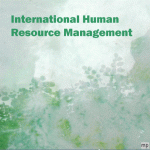 The scope of IHRM is wider than the domestic one. IHRM occurs when a national firm goes abroad, when foreign markets are entered.
The scope of IHRM is wider than the domestic one. IHRM occurs when a national firm goes abroad, when foreign markets are entered. Stereotypes
Stereotypes are a kind of generalisation. Our brain – exposed to an information overflow – organises the incoming data to function effectively. Behaviours, values, beliefs and patterns of thinking distinguish members of a certain group from another. Stereotypes are generalised statements made about members of certain groups.
Ethnocentric
Ethnocentrism is the tendency to believe that one’s ethnic or cultural group is centrally important, and that all other groups are measured in relation to one’s own. The ethnocentric individual will judge other groups relative to his or her own particular ethnic group or culture, especially with concern to language, behaviour, customs, and religion. These ethnic distinctions and sub-divisions serve to define each ethnicity’s unique cultural identity.
Sources: Margaret L. Andersen, Howard Francis Taylor (2006). Sociology: Understanding a Diverse Society. Thomson Wadsworth. ISBN 0534617166
http://en.wikipedia.org/wiki/Ethnocentrism (18.04.2013)
Polycentric
Polycentrism is the principle of organisation of a region around several political, social or financial centres.
In intercultural competence the term polycentrism is understood as attitude and openness towards other cultures, opinions and ways of life: when intercultural actions and correlations are interpreted not only with the background of own cultural experiences, but when the independence of other cultures is recognized and appreciated and when cultural values are relativised and seen in the whole context. This in the way of non-ethnocentrism, opposite to ethnocentrism. Source: http://en.wikipedia.org/wiki/Polycentrism (18.04.2013)
Regiocentric
What is regiocentric orientation?
It is an approach for staffing of foreign operations on a regional basis. If the firm is an MNC than it would recruit local people under this orientation.
Regional orientation is defined as a functional rationalisation on a more-than-one country basis. Subsidiaries get grouped into larger regional entities. Regions are consistent with some natural boundaries, such as the Europe, America and Asia-Pacific. Both polycentric and regiocentric approaches allow for more local responsiveness, with less corporate integration.
Read more: regiocentric orientation
Geocentric
A management orientation based upon the assumption that there are similarities and differences in the world that can be understood and recognized in an integrated world strategy. The geocentric orientation or world orientation is a synthesis of the ethnocentric orientation (home country)and polycentric orientation (host country).
Geocentrism is an approach found in international firms where host-country nationals manage the subsidiaries and co-ordinate operations on a regional basis. The geocentric orientation is a synthesis of the ethnocentric orientation (home country) and polycentric orientation (host country). There is local autonomy for day-to-day decision-making and regional control over strategic aspects of the subsidiary businesses. However, the top jobs at head office are dominated by parent-country nationals.
Source: http://www.marketingpower.com/_layouts/Dictionary.aspx?dLetter=G (18.04.2013)
Review Questions:
Describe the difference between ethnocentric, polycentric, regiocentric, and geocentric management orientations.
Hundreds of business terms can be found on the new Business English Posters:
http://wirtschaftsenglisch.lerntipp.at/